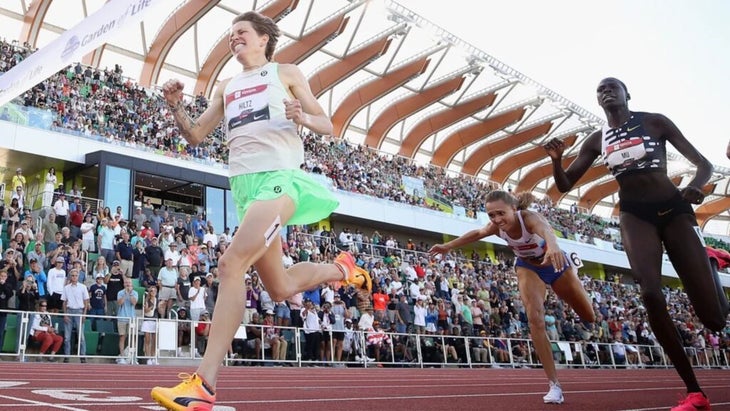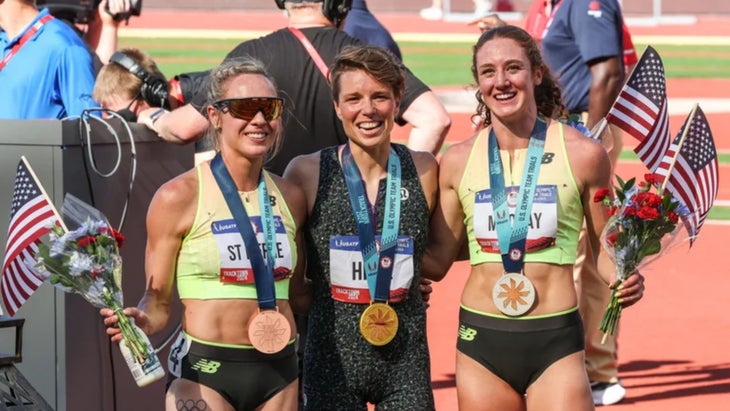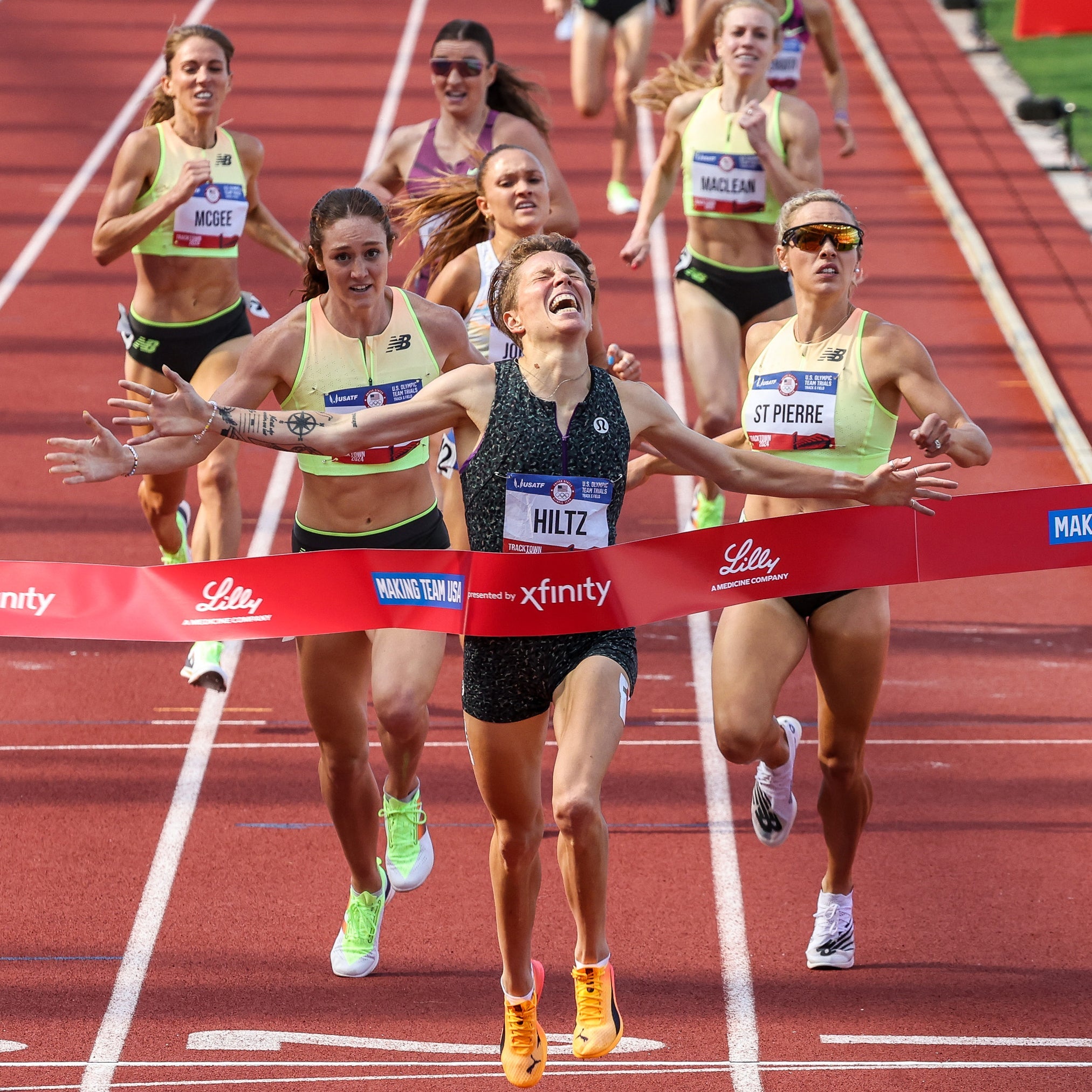It was a slow kill in a very fast race. Nikki Hiltz, easily recognizable in a distinctive black leopard print Lululemon onesie amid a sea of ubiquitous fluorescent kits, sprung out from lane one with the gun and settled on the rail. A hard-charging Elle St. Pierre led the field through the first 300 meters in nearly 45 seconds flat—a blazing 4:01 minute per mile pace. Yet Hiltz, tucked in fourth, looked unfazed, their orange, pink, and black Puma spikes bouncing off the track with each stride.
It was the women’s 1500 meter final at the U.S. Olympic Trials for track and field on June 30 in Eugene, Oregon. And Hiltz was waiting.
In the buildup to that race, the 29-year-old Hiltz had put in months of training, logging 70 miles a week at their high-altitude training base in Flagstaff, Arizona, along with routine strength work and numerous speed and double lactate threshold sessions on the track. Unlike in years past, however, Hiltz approached this race with another layer of preparation.
They got serious about prioritizing their mental health last December, when they sought out a sports psychologist.
“What’s going to set you apart [from your competitors] is your belief, your mindset, and your mental health,” Hiltz says. “The Olympics, the Olympic Trials, it’s a huge emotional thing. I want to cover all my bases so that I go in ready for anything.”
Every week, Hiltz met with a sports psychologist to dive into “everything you would possibly talk to a therapist about,” as they put it. From their upbringing in Aptos, California, where they found a love for track as a youth and also began to experiment with their gender identity at age six, to career hiccups, and coming out, twice.
Hiltz had previously come out as gay while in college. And in 2021, their gender identity .
“It’s been really helpful to unpack,” Hiltz says. “You bring it with you to the track. Whether or not it affects you during the race, it’s a part of you.”
The result? Hiltz has had their best year on the track yet. They won their first global medal—a silver in the 1500 meters at the World Athletics Indoor Championships on March 3 in Glasgow— and they made their first Olympic team in June by winning the 1500-meter finals in Eugene.
“I’ve found through working with her I can be more confrontational and assertive, and it doesn’t mean that people aren’t going to like me or make space for me,” Hiltz says. “That’s been really helpful when it comes to things like correcting people who get my pronouns wrong or things like that. That has translated to being more confident on the track. I can take up space here.”
RELATED: ��
Making Changes
Working on enhancing their mental health has been a game-changer, especially in comparison to their mindset three years ago. In March 2021, on Transgender Day of Visibility, Hiltz, whose sex was assigned as female at birth, took to social media to publicly address their gender identity.
“The best way I can explain my gender is as fluid. Sometimes I wake up feeling like a powerful queen and other days I wake up feeling as if I’m just a guy being a dude,” Hiltz wrote in an post.
Hiltz has expressed a desire to eventually have top surgery as well as hormone replacement therapy, the latter of which they will refrain from beginning until their competitive running career is over. As per official rules instituted by World Athletics, the international governing body for track and field, athletes who were assigned female at birth are allowed to compete in women’s categories so long as they haven’t received hormone therapy.
The identity announcement on Instagram, which occurred two months before the Covid-delayed 2020 U.S. Olympic Trials, was met with a mix of support and hostility. Hiltz was inundated with public comments and private direct messages.
The political climate toward transgender people in America at the time was less than accepting. On a national level, transgender inclusivity—particularly in sports—became a political linchpin. In 2021, Arkansas became the first state in the country to ban gender-affirming health care for minors. Another 154 anti-trans bills followed that year, with the number rising each year thereafter.
“It was a really hard time,” Hiltz says. “I wasn’t ready for that backlash. I did have a lot of love and support, but I wasn’t used to getting that much ugliness or hate. It really affected me later on that season.”
RELATED:
When Hiltz lined up at the U.S. Olympic Trials in June 2021, they showed early promise, winning their semi-final heat. But they crumbled in the final, finishing in last place, over 12 seconds behind winner St. Pierre. Their long-term dream of running for Team USA at the Tokyo Olympics was over. Hiltz later revealed that stress-induced sickness leading into the race had impacted their performance. They felt neither confident nor calm going into the competition. Simply showing up despite feeling scared and vulnerable, however, was necessary to display inclusivity in sports, Hiltz says.
Their career continued to transition. Hiltz, who had been sponsored by Adidas since 2018, didn’t re-sign with the brand after their contract expired at the end of 2021. Instead, Hiltz joined Lululemon in 2022 as a brand ambassador, describing the partnership as a gut decision.
“This was a brand that understood what I was trying to do on the track and reach all of my personal goals, but also knew that I was trying to grow the sport in other ways,” says Hiltz, who had relocated from San Diego to Flagstaff to train under Northern Arizona University track coach Mike Smith.
“It just felt right,” Hiltz says. “Mike Smith is a great guy, and I feel like we connected right away. It was definitely a leap of faith. I was looking at the big picture—that this was hopefully going to set me up for a good Olympic year in two years.”
Making Progress

With time, patience, renewed confidence, and hard work, Hiltz progressed. In February 2023, they became the first openly nonbinary U.S. national champion when they won the 1500 meters at the U.S. indoor championships. Two months later, Hiltz won the U.S. 1-mile road running championship, and then in June they completed a sweep of U.S. championship events by winning the 1500 at the U.S. outdoor championships.
Two weeks later, at the Monaco Diamond League meet, they finished a strong sixth place in the fastest women’s mile in history, crossing the line in 4:16.35 to break the American mile record that had stood for 38 years.
Although they missed making the 1500 meter finals at last summer’s World Athletics Championships in Budapest, Hiltz has rebounded with a strong season so far in 2024. Not only did they win another indoor U.S. title in the 1500, they also brought home the silver medal in the event from the World Athletics Indoor Championships in Scotland in March.
They believe their newfound priority on their mental fitness this season has kept them mentally and emotionally sound more than ever—and racing to the top of the podium.
“It is hard work at times to prioritize this stuff, especially when you’re so busy, and life gets in the way, but I think it’s super important,” Hiltz says. “It’s unlocked something in me and allowed me to excel at the next level.”
For 100 consecutive days leading up to the Olympic Trials, they invested in a daily guided meditation practice using the app. Journaling also became a daily habit, writing clear goals as a way to manifest their ambitions. Hiltz has also maintained a list of inspirational and motivational words and quotes in the notes app on their smartphone, referring to it whenever they experience moments of doubt. This collective mental toolbox will continue to be part of their preparation leading into their Olympics Games debut.
Hiltz’ partner, , also an elite runner who competed in the 3,000-meter steeplechase at this year’s U.S. Olympic Trials, has seen positive results first-hand.
“They’ve done a great job of prioritizing their mental health during this Olympic build,” Gee says. “I’ve noticed meditation and working with a sports psychologist has contributed to their focus and resilience, which has led to confident performances this season.”
That digging deep over the final 100 to outsprint the field and break the tape in the women’s 1500 meters at the U.S. Olympic Trials, a race many consider to be the deepest American field ever assembled, with four Olympians, three national champions, and seven sub-4 minute performers.
Hiltz not only ran the second-fastest time ever of any American in the women’s 1500, clocking a trials record of 3:55.33, they cemented a spot on Team USA, achieving a lifelong ambition. The result, a personal best for Hiltz, catapulted their ranking to in the women’s 1500. Currently, they have the in the world heading into the Olympic Games, just ahead of American teammates Emily Mackay andPierre.
RELATED:
The Olympic Trials win, on the last day of Pride Month, was of particular significance for Hiltz. In a post-race interview with NBC Sports, they said they had dedicated the race to the LGBTQ+ community, commenting, “This is bigger than just me.”
“Nikki’s participation in the Paris Olympics as one of the few nonbinary athletes serves as an important moment for Queer representation in sports,” Gee says. “It underscores the fundamental right of transgender and nonbinary individuals to show up as their authentic selves and belong wherever they choose to be.”
Hiltz has leaned into advocating for the LGBTQ+ community in sports and beyond throughout their pro career. They founded the annual in 2020, through which they have donated $172,000 to the, an organization that provides crisis and suicide intervention for LGBTQ+ youth. The 2024 race on October 12 will fundraise for the nonprofit, an organization that offers health and wellness care to the transgender community.
“Something I always go back to is a motto I live by: ‘Be the person you needed when you were younger.’ That has really driven me,” Hiltz says. “It’s important because you’re making space for a young version of Nikki out there now.”
RELATED:
Onto the World Stage��

While Hiltz still gets inundated with comments about their trans and nonbinary identity—both positive and negative—prioritizing their mental health and establishing a routine of mental wellbeing practices has helped them face and overcome the negativity.
“I feel very at peace with myself,” Hiltz says. “It’s been so great to personally do the work to know that I belong, this is a legit thing, and trans people exist.”
The Olympics will serve as an even greater platform for Hiltz to promote inclusivity while competing on running’s biggest stage. Hiltz, who will participate in the women’s 1500 meters, beginning on August 6 in Paris, will be one of few nonbinary athletes across all sports who will compete in Paris.
“Now it’s the world that I have to race. That’s really exciting to me,” Hiltz says. “Everyone is just leveling up right now. I’m excited to be a part of that, and to just go out there and see what I can do.”
Their goal is to advance to the August 10 final to have an opportunity to race for a medal. They’ll face a deep field that will include world record holder and two-time reigning Olympic champion
“Nikki is a formidable competitor,” Gee says. “They are strong, fast, strategic, and confident. With their current form and mentality, I believe they are capable of making the 1500 Olympic final and finishing in the top half of that race.”


